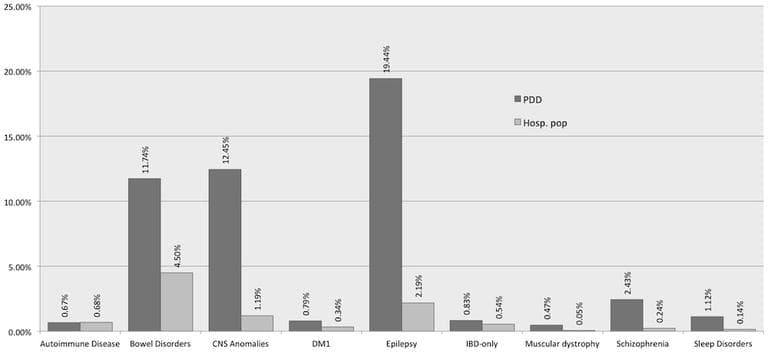Advertisement
New Numbers On Autism As A Disorder Of The Whole Body

[You can click on the chart above and select "View larger image" to magnify it.]
"I have come to believe that just as autism is not simply a genetics problem, it is not simply a brain problem, either. Autism involves the whole body. As a physician, I’ve seen so many autistic children with similar medical problems that I can’t believe it’s just a coincidence...At this point, I think there is enough evidence to say that while autism certainly involves the brain, it is really a problem of the whole body, including the brain, from molecules to cells, from organs to metabolism, from immune to digestive systems."
That passage comes from "The Autism Revolution," by Harvard neurologist Dr. Martha Herbert and CommonHealth contributor Karen Weintraub, a new book that we excerpted just last month. Now, just out in the journal PLOS One, is a Harvard paper that mined Boston hospital electronic health records of more than 14,000 young people and produced the striking illustration above of just how whole-body a condition autism can be.
Particularly of note in the chart: the high prevalence of bowel disorders in those with autism, a topic that has been somewhat controversial; and the high levels of schizophrenia and auto-immune disorders. I interpret the study's conclusions, below, as saying, "Kids with ASD — Autism Spectrum Disorders — don't just have brain problems, they may have many physical problems and we'd better all keep that in mind."
The comorbidities of ASD encompass disease states that are significantly overrepresented in ASD with respect to even the patient populations of tertiary health centers. This burden of comorbidities goes well beyond those routinely managed in developmental medicine centers and requires broad multidisciplinary management that payors and providers will have to plan for.
Dr. Herbert was not involved in the study, and I asked her for her take on it.
"We already knew that a lot of these conditions exist in autism," she said, though "many people thought that they were not any more common in autism than in the generally population. But this study shows that many of these conditions occur more frequently in autism, although there still remains some uncertainty."
"What we don't know yet," she said, "is, how do we translate these correlations into clues that lead us to underlying biology? Because once we're dealing with these kinds of medical issues, we're not just talking about broken genes in the brain, we're talking about conditions that we might be able to help medically."
Read the full PLOS One paper here.
This program aired on April 18, 2012. The audio for this program is not available.
